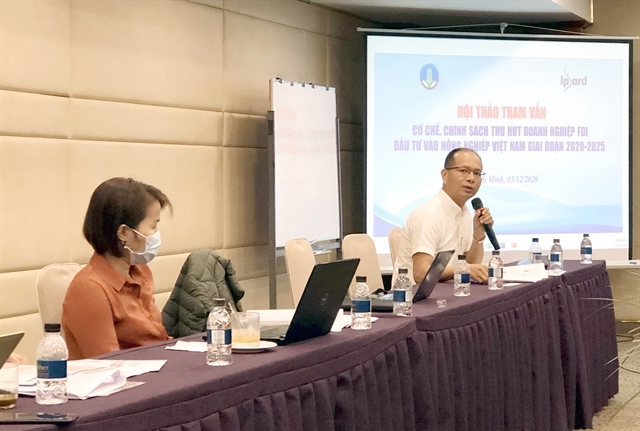Foreign direct investment in Viet Nam's agriculture sector remains limited despite the industry's enormous potential.

Foreign direct investment in Viet Nam's agriculture sector remains limited despite the industry's enormous potential.
Wide-ranging measures that would attract more investment and help modernise the sector are needed, delegates said at a seminar held in HCM City on December 3.
Nguyen Thi Hong Thanh from the Information Centre for Agriculture and Rural Development under the Institute or Policy for Agriculture and Rural Development, said: “As of December last year, FDI in the agricultural sector remained modest, accounting for just 1.61 per cent of the total number of FDI projects and 0.97 per cent of total FDI capital into Viet Nam.”
Taiwan, the Virgin Islands, Singapore and Thailand are among the largest foreign investors in the field, she said, adding that foreign investors have mainly invested in cultivation, animal husbandry, forestry, aquaculture, and agricultural production and services.
Foreign investment in the sector has brought technology transfer and new production models that have improved added value and competitiveness of Vietnamese products. It has also helped to create more jobs and improve infrastructure in rural areas, and enabled the sector to directly connect to global value chains.
But foreign investors have mainly invested in some localities and sub-sectors mostly because of difficulties in accessing land to develop a stable source of materials and limited logistics services and infrastructure, she said.
Vu Xuan Dang, deputy director of the Southern Investment Promotion Agency, said there was not a large land fund for agricultural production in many localities, and some localities with large land funds give priority to industrial parks.
Nguyen Huu Nam, deputy director of the Viet Nam Chamber of Commerce and Industry – HCM City branch, said that with the small scale of agricultural land, it would be difficult to develop concentrated production areas and apply advanced technology and machines. As a result, post-harvest losses are high, which adversely affects foreign investment.
Nguyen Anh Phong, director of the Information Centre for Agriculture and Rural Development, said that foreign investors in agriculture have complained about access to information related to land-use planning and the quality of public services.
Le Minh Thuy Trang from Eurocham agreed, saying that administrative procedures were the top concern of foreign investors.
The Government has policies to attract foreign investors, including corporate tax and land rental incentives, but the policies should clearly state the incentive rates, she said.
Delegates at the seminar also discussed measures to lure more foreign investors to the sector in the coming time.
Phong said the country should prioritise foreign investment in the sectors and products that have comparative advantages, high added-value, and potential for market expansion. Those using advanced and environmentally-friendly technology should also be a priority.
Improving the investment environment and reforming policies related to land and taxes are also needed, as well as upgrading infrastructure and training human resources in rural areas, he added.
Dang said the country needs to “create more favorable conditions for foreign investors, including policies to encourage the development of concentrated animal husbandry areas and material zones, large-scale fields, and high-tech agricultural zones.”
In addition, the Government should increase investment in infrastructure development in the northern mountainous region, the Central Highlands, and the Mekong River Delta region, which all have localities with high potential for agricultural development.
Improving the quality of local human resources to meet agricultural development in the 4.0 industry era is also a must, he added. — VNS





